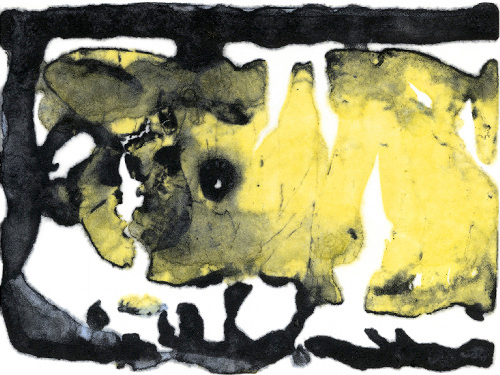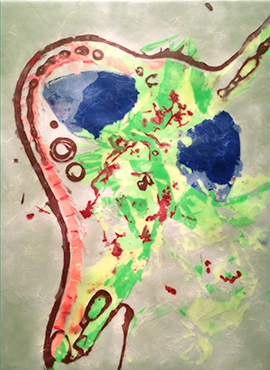TSUTSUI Shinsuke Exhibition(TOKYO)
30 April - 31 May 2014
Mizuma Art Gallery is pleased to announce the solo exhibition of TSUTSUI Shinsuke, opening on Wednesday 30th April 2014.
The exhibition features Tsutsui’s original illustrations for the serialized story ‘聖痕Seikon [Stigmata]’ which ran for 8 months in the Asahi Shimbun from July 2012.
Although rendered on paper measuring only 12.3×16.5cm, these works count many stages in their creation process. Firstly, using as specimens the bodies of dead insects he has collected, Tsutsui photographs them through a microscope and renders the outlines of this image on pattern paper. He then places the pattern paper over a glass slide, and removes it piece by piece, replacing it with oil pastel over which melted wax is poured, as if filling in the pieces of a puzzle. Once all the pattern paper has been removed, there is a thick, coloured build-up of wax on the surface of the glass. This is scraped off with a knife and placed on paper, to which heat is applied from below. The melting wax permeates and affixes to the paper, uniting the finished work.
Tsutsui has worked consistently using insects as his motifs for over twenty years Although the finished pieces may appear very abstract, by a slight effort of imagination we can perhaps begin to see traces of something else within. Tsutsui has said of this: ‘Even if within the motif itself you can’t see anything, what is more important is if something else becomes visible. So even if the artwork parts with its meaning, I think this is surely a sign of it achieving independence.’
This seems in concord with the words of the artist’s father, the author Tsutsui Yasutaka, about the text he wrote for ‘聖痕 Seikon’ . ‘I experimented with words used decoratively in the prefaces to classical literature, and made large use of archaic language. By rehabilitating words not spoken much any more in Japan, I sought out fresh means of expression.’
The works in this exhibition are not simply ‘illustrations’ to accompany textual content. By instead considering each as an independent‘artwork’, we may better understand Tsutsui’s own approach to artistic expression: drawing inspiration from the currents of art history to produce his abstract creations.
If in Tsutsui’s pieces, their materials spun from the words of his father, we may begin to unfurl the meanings of different stories – might we not freely release the limitless possibilities of the human imagination?
This serialized novel constitutes the first subject matter on which father and son have worked together. We invite you to view the fruits of their collaboration in these 238 pages of their world.

